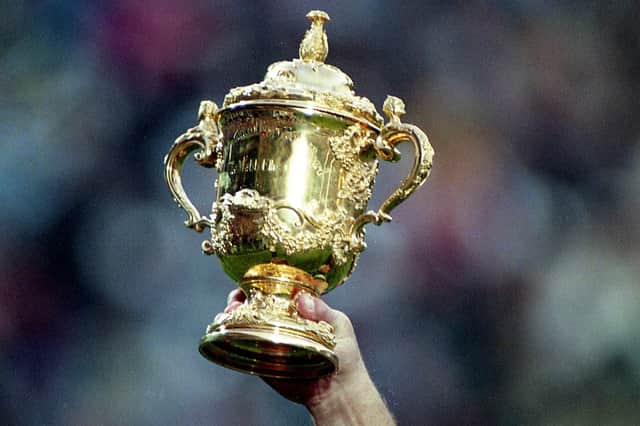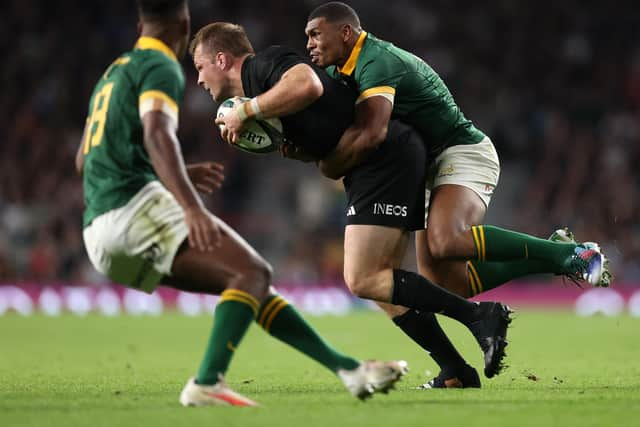Rugby World Cup: France to flourish, lopsided tournament, Scotland aim to avoid unwanted first


With three of the world’s top five – Ireland, South Africa, Scotland – in Pool B and the tournament’s joint favourites – France and New Zealand – in Pool A, something has to give, and at least one of those nations is going to miss out on a place in the quarter-finals. The fervent hope is it won't be Gregor Townsend’s side who are bidding to avoid group stage exits in back-to-back World Cups. Scotland have never before experienced such ignominy but no previous Scottish side has been handed as prickly a draw as this one. Paired with holders South Africa, top-ranked Ireland, a Tonga side boosted by ex-All Blacks and likely makeweights Romania, Pool B has redefined that favourite old cliché, Group of Death.
Scotland open against the Springboks in Marseille next Sunday, with memories of their opponents’ stunning win over the All Blacks at Twickenham still fresh. A victory at the fabled Stade Velodrome would surpass anything Townsend has achieved in his previous 70 matches in charge, a reign which includes three wins in a row over England and a rare triumph over France in Paris. Defeat wouldn’t be the end but it would mean Scotland almost certainly needing to win their three remaining group games against Tonga, Romania and Ireland.
Advertisement
Hide AdAdvertisement
Hide AdBeating the first two should be well within their grasp but the showdown against the Irish at the Stade de France on October 7 is likely to make or break Scotland's campaign. Townsend has never got the better of Ireland in eight meetings as head coach and the heavy defeat in Scotland’s opening game of the last World Cup in Japan still festers. Throw in the enmity that has crept into this fixture and you have all the ingredients of a classic.


Ireland, incredibly, have never made it beyond a World Cup quarter-final but come into this tournament with designs on lifting the Webb Ellis Cup. Last year's ferocious series win over the All Blacks in New Zealand served notice of their intent and the Six Nations grand slam confirmed it. Andy Farrell has them on the boil but can they handle the weight of expectation?
No country has higher expectations than France who as host nation have the best opportunity yet to land the game's biggest prize. Fabien Galthie's side combine a physically dominant pack with an electrifying backline led by the incomparable Antoine Dupont but injuries are mounting. Paul Willemse is the latest French star to be forced to the sidelines, with the lock ruled out of the entire tournament. Prop Cyril Baille and centre Jonathan Danty will miss the start and, most grievously of all, France will be deprived of their stand-off Romain Ntamack, who ruptured his knee ligaments against Scotland in Saint-Etienne and won’t return until some time next year.
They play New Zealand in the tournament opener in Paris on Friday and it would be no great surprise if the teams returned there to contest the final on October 28. The French dream is Dupont lifting the golden prize aloft in Saint Denis but this is a country that has fallen at the final hurdle on three occasions: 1987, 1999 and 2011. No other team has reached as many finals and not won the World Cup.
Down in the bottom half of the competition it's more about groups of dearth as an assortment of out of form heavyweights try to recapture former glories. Unfair? Perhaps. Anyone who watched Fiji defeat England at Twickenham and Samoa run Ireland close in Bayonne last weekend couldn't help but be thrilled by the underdogs' performances and what it might mean for the tournament.


Fiji are now ranked seventh in the world, higher than England, Australia, Wales and Italy and will harbour serious ambitions of a top-two finish in Pool C where they have been drawn alongside the Welsh, the Wallabies, Georgia and Portugal. Fiji last reached the quarter-finals in 2007. Then, like now, France were the hosts, and the islanders were beaten by eventual winners South Africa in the last eight.
Their opening game this time around is against Eddie Jones' Australia, a side so mired in misery that their irascible coach has already turned on the media. Jones is five defeats from five with 179 points conceded in his second stint in charge of the Wallabies and footage of him berating Aussie journalists while wearing a ludicrously oversized Harrison Ford-style hat quickly went viral. “Eddiana Jones and the Media of Doom”, quipped one social media wag. Can Eddie recover and find the Holy Grail? Stranger things have happened and if they can rediscover some form, Australia have a relatively straightforward path into the semi-finals.
The same can be said for England who, under Jones’ successor Steve Borthwick, have been equally dire but could end up facing the Wallabies in the quarter-finals. Some dangerous obstacles lie in their path, most notably Argentina who, under Michael Cheika’s shrewd guidance have a knack of rising to the occasion as evidenced by their 30-29 win over England at Twickenham last year when Emiliano Boffelli scored 25 points. The popular Edinburgh full-back had a frustrating season at club level but has the talent to light up this tournament like the great Juan Martin Hernandez did for the Pumas at the 2007 World Cup in France.
Advertisement
Hide AdAdvertisement
Hide AdArgentina finished third on that occasion, beating the host nation twice and winning the hearts of neutrals with their panache. This time around they benefit from being in the easier half of the draw which was made on December 14, 2020, when the rankings were very different to what they are now and Scotland, who are currently fifth in the world, were placed in the third pot of seeds.
The timing is an anomaly that needs to be corrected and you would hope World Rugby will see sense in holding off until closer to the tournament for future editions so the draw reflects more accurately the standings of the respective countries when the competition begins.
Rugby will be under the microscope over the next two months with particular focus on how it deals with high tackles and head injuries. Prof Willie Stewart, the eminent Scottish neuropathologist and former adviser to World Rugby, believes that the sport is on the cusp of huge change. “I think this World Cup is the end of rugby as we know it,” he told the Associated Press. “I think the current form of rugby union as it is played will change straight after the World Cup.”
There are increasing concerns about the health of players, and especially the effect repeated knocks to the head can have on the brain. The sport’s disciplinary chiefs hardly covered themselves in glory last month when they rescinded Owen Farrell’s red card for a high tackle on Wales’ Taine Basham, seemingly disregarding their own laws. The wider rugby world reacted with outrage, prompting the game's governing body to appeal the decision of the disciplinary committee. Common sense eventually prevailed and Farrell was issued with a backdated four-game ban, meaning he will miss England's first two group games, against Argentina and Japan.
Similar incidents will occur over the course of the next eight weeks and it’s vital they are dealt with in the correct manner. It’s already too late for some but rugby has a duty of care to protect its players and how they do that will be scrutinised at this tournament like never before.
The World Cup has been something of a closed shop in terms of eventual champions but this is probably the most open edition of the tournament. The previous nine iterations have produced just four different winners. South Africa and New Zealand lead the way with three crowns each, Australia have two and England's Jonny Wilkinson-inspired success of 2003 remains the lone victory for the northern hemisphere. Could that change this year?
The Springboks look to be coming to the boil at exactly the right time, the All Blacks can never be discounted but it would be a minor miracle if Australia got their act together quickly enough to repeat their previous successes.
If we look to Europe for a challenger then the stage is surely set for hosts France to make good at last on their abundant potential. They have the coach, they have the players, they have the game. If not now, then when?
Comments
Want to join the conversation? Please or to comment on this article.
